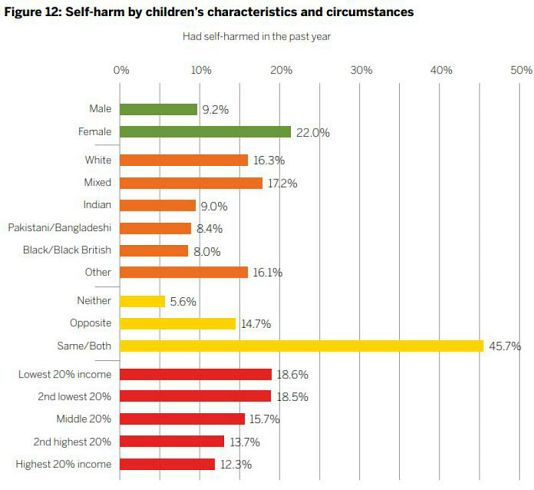More than one-fifth of UK girls aged 14 said they had self-harmed, a new study has found.
More than one-fifth of UK girls aged 14 said they had self-harmed, found a new study.
A The Children's Society report surveyed 11,000 British teenagers, asking them if they had hurt themselves on purpose in the year prior to the questionnaire — 22% of girls and 11% of boys said they had.
Of 5,624 girls who were asked, 1,237 said they had self-harmed, which includes punching, hitting, cutting or burning themselves.
Chief Executive of The Children’s Society Matthew Reed cited "the damaging effects to girls’ well-being of being bombarded by comments about their appearance at school," as one of the examples of issues facing teenagers.
The study also found that children attracted to the same or both genders have "markedly lower well-being" and higher rates of depression than other children, with almost half of these young people self-harming.
In addition, children in the Indian, Pakistani/Bangladeshi and black/black British ethnic groups were much less likely to self-harm than children from white, mixed and other groups.
The data used in The Good Childhood Report was collected in 2015 in the Millennium Cohort Study, which saw 19,000 children born in the UK between 2000 and 2001 followed by researchers.
As an overall trend, children's happiness with their lives was as low as it has been for two decades. This perception steadily rose from 1995 to 2010 but the progress has now been reversed.
Girls had lower life satisfaction and higher depressive symptoms, factors that researchers said were better predictors of children having self-harmed than other measures presented in the study like emotional and behavioural difficulties.
"Our evidence shows that traditional gender stereotypes are still common and can be harmful to children’s well-being," said Reed.
The report suggested children felt under pressure from friends to be good looking but those who felt boys should be tough and girls should have nice clothes were least happy with life.
Among other measures, Reed recommended that issues like appearance, gender stereotypes and sexuality be included in the new Relationships and Sex Education curriculum.
He also said The Children's Society wants the Government to make it a requirement for all secondary schools to offer access to a counsellor to regularly monitor children’s well-being and have their mental health provision assessed as part of Ofsted inspections.
"The reality is that we all need to do more to make sure every child feels happy and included at home, school and in our communities," he concluded.












